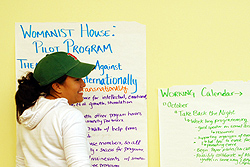Workshop Helps Program Housing Develop Plans of Action
Students living in Wesleyan’s program house, ”Earth House,” want to promote the values of eating fresh, healthy foods in Middletown. They had ideas to create a bulk food education program, an easy nutritional cooking class and help 20 local residents obtain fresh foods in their homes.
During a workshop held Sept. 6, the students turned their ideas into a plan of action. Titled “Global Citizenship: Engaging in Local Social Issues with Global Implications,” the day-long event helped Earth House and fellow program houses design realistic programs that could be accomplished during the academic year.

“The workshop was very motivating for us,” says Rebecca Bilodeau ’11. “It helped us assess the feasibility of some of the aspects of our projects, and gave our ideas a more concrete form.”
The pilot program, held Sept. 6 in Beckham Hall and Usdan University Center, was sponsored by the Office of Residential Life and the Office for Diversity and Student Engagement. It allowed students to transform brainstorming ideas into cohesive action plans; provide team time for houses to work together in formulating programs for the year connected to their missions; offer a structure that empowers program houses in pursuing their ideas linked to their missions; and to develop a model for continued enhancement for houses to explore.
By the end of the workshop, the program housing residents developed solid service-learning action plans that both affect their lives and are relevant in a global context.
“We hope the pilot program helps our program housing residents transform their residential spaces into dynamic learning laboratories,” says Maureen Isleib, associate director of residential life. “Through this program, the students will be able to more deeply explore an issue related to their house mission, develop meaningful relationships with supporting faculty and staff, and have an opportunity to translate their work in the classrooms to real life problems and situations.”
While Earth House students focused on food politics and food education in Middletown, the Community Service House planned to compile an art-based publication filled with student work, lesson plans, critical essays and student reflections. The contents would be based on independent involvement in a variety of existing and commencing community programs run by other student groups. Residents at Womanist House designed a plan to raise awareness of violence against through a stage performance, invited speakers and art involvement.

“I believe the workshop helped us come up with concrete ideas for programs and the chance to structure out a timeline for some of our bigger events,” says Mayra Vega ’10, the house manager at Womanist House.
Each program house was mentored by a staff consultant and assisted by a faculty and staff panel. Glenn Gabbard, associate director of the New England Resource for Higher Education, mentored the Earth House’s program.
“It was great to get feedback from Glenn and from the panel,” Bilodeau says. “Much of the panel’s feedback was fairly detailed, which was great, giving us confidence in the overall structure of our pilot program idea.”
After a semester of work, the program housing teams will reconvene again at the beginning of the spring semester to foster cross-team learning. Teams will present their progress in implementing their educational models as well as challenges faced over the past semester. Teams will critique and offer advice to each other.
A second workshop will be held in January for other program houses.
“Eventually, we hope all program houses will have the opportunity to attend the workshop and learn how they can enhance their service to the campus and surrounding communities,” Isleib says.

